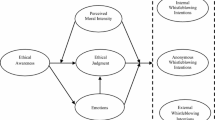Abstract
This paper analyzes the number of procedural and substantive tension points with which a conscientious whistleblower struggles. Included in the former are such questions as: (1) Am I properly depicting the seriousness of the problem? (2) Have I secured the information properly, analyzed it appropriately, and presented it fairly? (3) Are my motives appropriate? (4) Have I tried fully enough to have the problem corrected within the organization? (5) Should I blow the whistle while still a member of the organization or after having left it? (6) Should I keep anonymity? (7) How ethical is it to assume the role of a judge? (8) How ethical is it to set in motion an act which will likely be very costly to many people? Substantive tension points include such questions as: (1) How fully am I living up to my moral obligations to my organization and my colleagues? (2) Am I appropriately upholding the ethical standards of my profession? (3) How adversely will my action affect my family and other primary groups? (4) Am I being true to myself? (5) How will my action affect the health of such basic values as freedom of expression, independent judgment, courage, fairness, cooperativeness, and loyalty?
Similar content being viewed by others
References
Agee, Philip: 1976, Inside the Company (N.Y.: Bantam Books).
Baldwin, Deborah: 1985, ‘The Loneliness of the Government Whistleblower’, Common Cause Magazine (Jan./Feb.), pp. 32–34.
Bok, Sissela: 1982, Secrets: On the Ethics of Concealment and Revelation (New York: Pantheon Books).
Bormann, Ernest G.: 1975, Discussion and Group Methods: Theory and Practice, 2nd ed. (New York: Harper & Row), Chapter 3.
Dean, Malcolm: 1985, ‘Man Who Blew the Whistle on Firm Demands £1/2m.’ Manchester Guardian Weekly (June 2), p. 5.
DeGeorge, Richard T.: 1981, ‘Ethical Responsibilities of Engineers in Large Organizations: The Pinto Case’, Business Professional Ethics Journal 1 (Fall), 1–17.
DeGeorge, Richard T.: 1982, Business Ethics (New York: Macmillan), pp. 157–165.
Elliston, Frederick A.: 1982, ‘Civil Disobedience and Whistleblowing: A Comparative Appraisal of Two Forms of Dissent’, Journal of Business Ethics 1, 23–28.
Elliston, Frederick A.: 1982, ‘Anonymity and Whistleblowing’, Journal of Business Ethics 1, 167–177.
Eveland, Wilbur Crane: 1980, Ropes of Sand: America's Failure in the Middle East (London: W. W. Norton & Co.).
Ewing, David W.: 1977, Freedom Inside the Organization (New York: McGraw-Hill).
Glazer, Myron: 1983, ‘Ten Whistleblowers and How They Fared’, The Hastings Center Report 13 (Dec.), 33–41.
Goodman, Ellen: 1984, ‘It's Hard Work Spending All That Money’, Minneapolis Tribune (Sept. 25), p. 10A.
Johannesen, Richard L.: 1983, Ethics in Human Communication, 2nd ed. (Prospect Heights, Ill.: Waveland Press).
Kosterlitz, Julie and Lee Norrgard: 1984, ‘The Selling of the Pentagon’, Common Cause Magazine 10 (Nov./Dec.), pp. 14–18.
LaCroix, Wilfred L.: 1979, Principles for Ethics in Business, rev. ed. (Washington, D.C.: University Press of America), pp. 118–120.
Minneapolis Star and Tribune (June 14): 1985, p. 19A.
Nader, Ralph, Mark Green and Joel Seligman: 1976, Taming the Giant Corporation (New York: W. W. Norton).
Nader, Ralph, Peter J. Petkas, and Kate Blackwell, eds.: 1972, Whistle Blowing: The Report of the Conference on Professional Responsibility (New York: Grossman).
Nilsen, Thomas R.: 1979, ‘Confidentiality and Morality’, Western Journal of Speech Communication 43, 38–47.
Oberdorfer, Dan (editorial): 1984, Minneapolis Tribune (Sept. 15), p. 18A.
O'Neil, Robert: 1978, The Rights of Government Employees (New York: Avon Books).
Pearson, Drew and Jack Anderson: 1968, The Case Against Congress (New York: Simon and Schuster), Part I.
Peters, Charles and Taylor Branch: 1972, Blowing the Whistle: Dissent in the Public Interest (New York: Praeger).
Redding, W. Charles: 1985, ‘Rocking Boats, Blowing Whistles, and Teaching Speech Communication’, Communication Education 34, 245–258.
‘Revising the U.S. Senate Code of Ethics’, The Hastings Center Report 11 (Feb. 1981), 1–28.
Sanders, Wayne: 1981, ‘Free Speech for the Private Employee: Will State Action Rulings Bring the Constitution to the Workplace?’, Southern Speech Communication Journal 46, 397–410.
Sanders, Wayne: 1983, ‘The First Amendment and the Government Workplace: Has the Constitution Fallen Down on the Job?’, Western Journal of Speech Communication 47, 253–276.
Smith, Stephen A.: 1983, ‘The Uncivil Servants: Public Employees and Political Expression’, Free Speech Yearbook: 1983, pp. 51–61.
Stewart, Lea, P.: 1980, ‘Whistleblowing: Implications for Organizational Communication Scholars’, paper at the International Communication Association convention, Acapulco, Mexico, May 18–23, 1980.
Walters, Kenneth D.: 1975, ‘Your Employee's Right to Blow the Whistle’, Harvard Business Review 53 (July–Aug.), 26–34++.
Walters, Kenneth D.: 1976, ‘Employee Freedom of Speech’, Industrial Relations 15, 26–43.
The Washington Monthly, ed. by Charles Peters, 1969 — present.
Werhane, Patricia: 1983, ‘Individual Rights in Business’, in Tom Regan, ed., Just Business: New Introductory Essays in Business Ethics (Philadelphia: Temple University Press), pp. 114–119.
Westin, Alan F., ed.: 1981, Whistle Blowing: Loyalty and Dissent in the Corporation (New York: McGraw-Hill).
‘“Whistleblower” Gets Poor Job Rating’, The New York Times (August 1), 1985, p. 12A.
Winslow, Gerald R.: 1984, ‘From Loyalty to Advocacy: A New Metaphor for Nursing’, The Hastings Center Report 14 (June), 32–40.
Author information
Authors and Affiliations
Additional information
J. Vernon Jensen is professor in the Department of Speech-Communication at the University of Minnesota where he teaches courses in ethics among other subjects. Some recent publications are ‘Teaching Ethics in Speech Communication’, (Communication Education 34 (October, 1985), ‘Bibliography: Ethics in Speech Communication’, (Rhetoric Society Quarterly 15 (Winter & Spring, 1985), and Argumentation: Reasoning in Communication (1981).
Rights and permissions
About this article
Cite this article
Jensen, J.V. Ethical tension points in whistleblowing. J Bus Ethics 6, 321–328 (1987). https://doi.org/10.1007/BF00382941
Issue Date:
DOI: https://doi.org/10.1007/BF00382941




